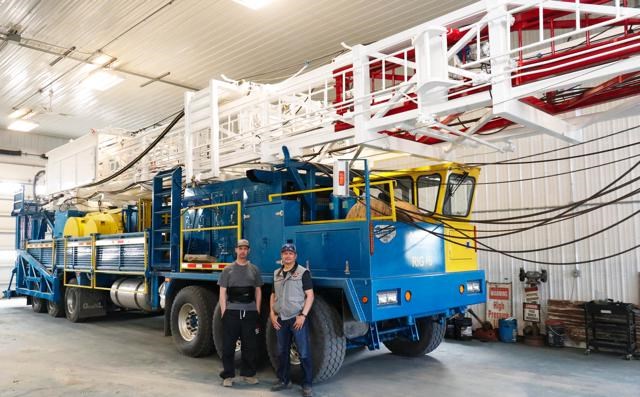The owner-operators of an established service rig company, Jonathan and Tyler Kmita, are “cautiously optimistic” about the future of the oil industry in the southeast — but only if there’s a change in government in October.
The brothers are carrying on the business of John Kmita Ltd., located on Highway 13 just east of Weyburn, with a fleet of service rigs that includes a brand new rig they bought over the winter from their supplier in Leduc, Alta., after retiring their rigs No. 1 and 2.
“When we decided to build a new rig, we were done paying for Rig No. 5. Rig No. 4 was built in 2009-10, which we got in the last part of the downturn at the time so we could save a little money,” explained Jonathan. “So with the new rig, we thought it was a good time to upgrade our equipment, and the original rigs, No. 1 and 2 got retired.”
Their late father, John, bought those two rigs in 1966 and 1969 respectively to start the company off, and as Jonathan pointed out, they have essentially the same equipment as the new rig, such as the draw works, but with not as many bells and whistles.
He admitted it was “a bit of a gamble” when they spent the money to buy a new rig, but noted part of the success of their operation is to maintain a low debt load that helps make such a purchase possible.
“It’s kind of steady right now, but not too busy. I guess we’re fortunate enough with the clients we have, that we’ve stayed working,” said Jonathan. “In the southeast, we’re somewhat isolated from Alberta, almost like we’re on our own island. We seem to roll along better than other locations.”
While the Kmita rigs have been working, the offsetting factor is that with the downturn going on over four years now, the prices paid by oil companies has dropped by 30 to 35 per cent from what they paid during the boom time.
“No matter what industry you’re in, it’s hard to manage a 30 to 35 per cent cut,” he said, adding of the cyclical nature of the oil industry, “It’s the nature of the beast. We rode a pretty good wave for a while.”
Part of the cause of the ongoing downturn is “the political climate federally” which has been hurting the oil and gas industry, particularly with the inability to get any pipelines built.
The opposition of many groups to the pipelines is misplaced, and many people are misinformed about what is involved with the industry, said Jonathan.
“They don’t realize how dependent we are on fossil fuels,” he said, pointing out the demand for fuel and products made from petroleum is not declining but increasing.
He also noted that projects like the Energy East pipeline was stopped by opposition in the East, and yet they bring in millions of barrels of oil from Saudi Arabia, where the labour and environmental standards are at a far lower level than the standards set for the oil produced in Canada.
Jonathan added that this region, which includes the Bakken formation, has the third largest reserve in the world, so it’s difficult not seeing as much work going on as there should be.
With the price of oil in the range from $62 up to about $70, “it’s been brutal, no matter who you’re talking to with the downturn going this long. It’s been four and a half years already. Nobody thought it would last this long,” said Jonathan, noting some companies like Weatherford have gone into bankruptcy as a result.
“You try to learn to plan in the good times, and you try to keep the debt load down,” he said, adding they also try and keep their service rigs maintained and in good repair, because when a job comes around, “you can’t work when you’re broken down.”
The other key to longevity is diversifying one’s business so you can keep working.
“It’s a tough balancing act,” said Jonathan.
“We take care of the guys at work, and them time in the shop,” added Tyler. “If you don’t have a good crew, it’s kind of tough to go to a job. Dad always insisted that we treat our guys right.”
“It takes a good men to run a good crew,” said Jonathan, who laughed and passed on another saying that their dad always said, “Good service doesn’t cost, it pays.”
Tyler noted that treating their workers right pays off in the long run, and said next year they have two employees who will have been with the company for 25 years.




